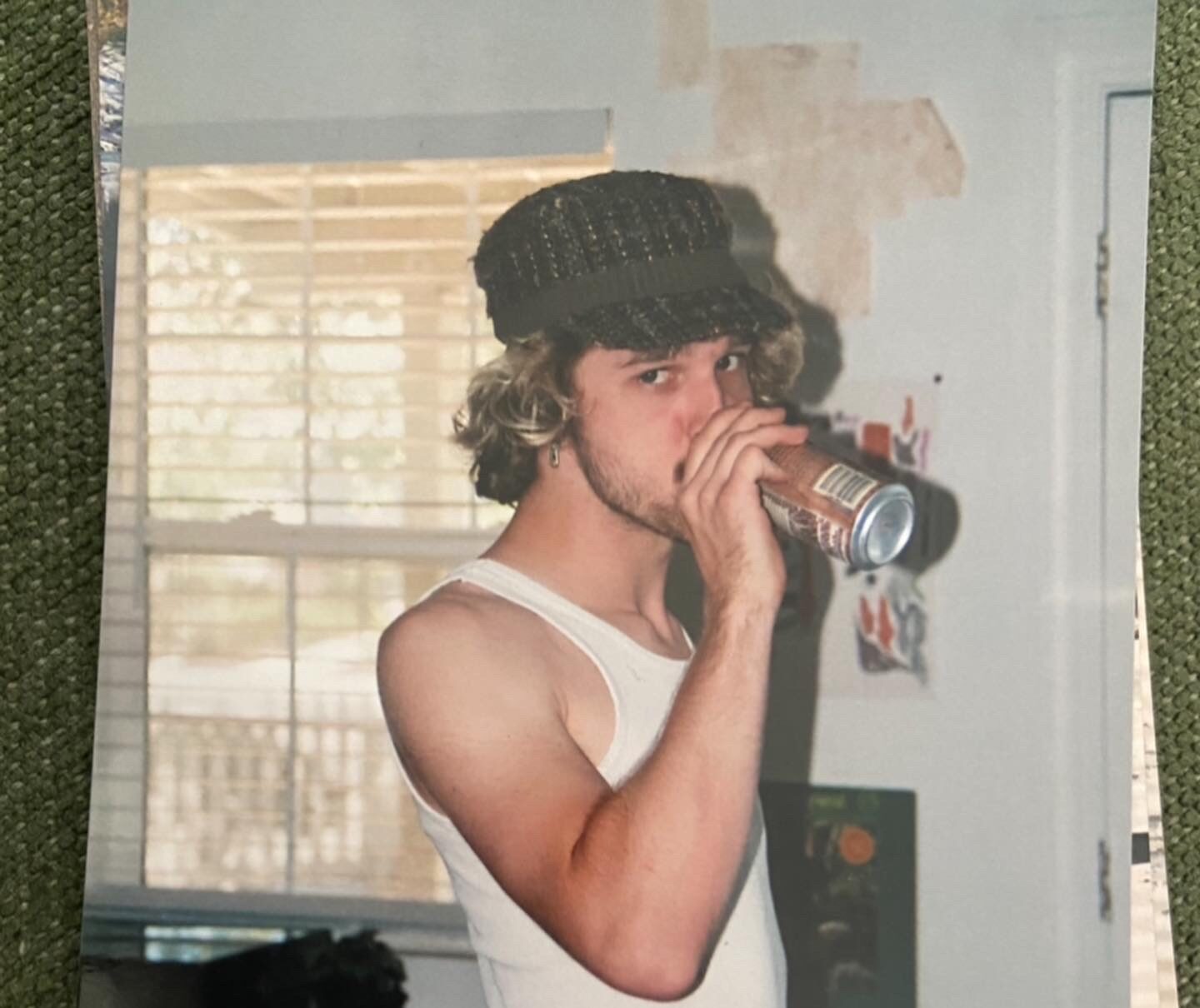I recently moved from New York to Northern California, mostly on a whim. After getting settled in my new home, I started working at a local restaurant, where I met Plum Anderson. They’re a talented multi-instrumentalist, playing in Sacramento-area bands like Mediocre Café, Cugino, and Bagel Pat; they also make their own lush, eclectic indie-pop songs from a shed in their backyard.
On a recent sunny afternoon, I headed over to their place to admire their setup and ask them about their process, with their newest single “How Do You Do It” soundtracking the drive over.
Alright, first question! Tell the people who you are and what you do.
PA: I am Plum Anderson. I’m a self-recording DIY artist. I make pop music, and love songs primarily, in the style of, like, 80s R&B mixed with shoegaze and jazz fusion.
I’m curious about how that combination of influences came about, like if that was a conscious thing or if that was what was coming out naturally.
PA: I think that originally, I made the project so that I could experiment with the talent that I had hidden away for so long. I played piano, that was my first instrument, but I didn’t really ever show people that. I mostly played guitar, and I played in indie rock bands, but I wanted to do something jazzy. So my first project, Two Voices, is like me kind of trying to make the songs that I want to hear.
I have some songs that are super Beach Boys-influenced, because I love the Beach Boys, and some songs that are post-punk-influenced. So it was just like, whatever I would like to hear and make, I was just putting it out there and lumping it all together.
Were you a self-taught pianist and guitarist?
PA: Well, I took piano lessons for two years, starting when I was six, which were mostly classical and, like, silly “Yankee Doodle”-type songs. Like I played the Star Wars theme for my recital.
But then I was like, I hate this, I don’t like these songs I’m learning, I want to experiment and teach myself. And I was like, “I’m going to teach myself jazz.” So I tried to learn jazz, and I have a very vague understanding of those kinds of chords and of music theory. But I feel like I have my own understanding of it, and I like it that way.
So it’s kind of a thing where you’re learning the language in terms that you understand, as opposed to learning it in a textbook way?
PA: Yeah, I definitely haven’t read textbooks when it comes to music. [laughs]
So I know, before you did Plum Anderson, you were in other bands – and I know you’re still in other bands as well. How is it different doing your own work versus working with other artists?
PA: Since I grew up, I was practically an only child, because my brother and sister are older than me. So I definitely flourished artistically when I was by myself. I love recording by myself and getting lost in the process and writing that way. It’s kind of hard for me to write with other people, but it’s inspiring and I like to do it.
In the other bands that you’re in now, are you part of the writing process, or is it more that you just come in to play the parts?
PA: For Mediocre Café, I used to write songs, but now I kind of spruce up the parts that are given to me and make them my own. I haven’t written anything for Cugino, but I kind of improvise in all the bands I’m in, and I don’t really play specific parts. I kind of take what I’m hearing and I try to do something with it.
When you were living at home [with your family], were you recording then too?
PA: I used to record in the garage of my parents’ house in a very cramped corner. I would plug my interface in on a TV tray and then I’d have a keyboard stand, and I’d just record all in that corner. Something about recording in my actual room was kind of hard for me, because it was like there were too many distractions or something… and I was too close to my parents.
Were they supportive of you making music?
PA: They were supportive of me being a musician, but they didn’t want to hear it. [laughs]
Fair enough. I mean, I don’t agree, because I like your music! So how has your recording setup changed over the years?
PA: Originally, I had a laptop and something similar to an iRig – it’s called an Apogee Jam, it’s like an HD thing – and that’s how I recorded Two Voices. I plugged that into a keyboard and into a shitty mic. When you think about it, it sounds like a pretty fucked-up recording setup… [laughs]
It allowed a lot of creative fun, you know? Because it was such a small, uncomplicated setup. It wasn’t super nice, but it was just fun. I still don’t really have monitors and I kind of continue to like having a setup that isn’t super grandiose and overwhelming, you know? I kind of just take my laptop and record on the floor.
So are you largely a self-taught producer?
PA: Yeah! I usually don’t mix my own music, I don’t understand how to mix very well. My friend Jake Romain, who goes by Natural Death, has mixed all my stuff.
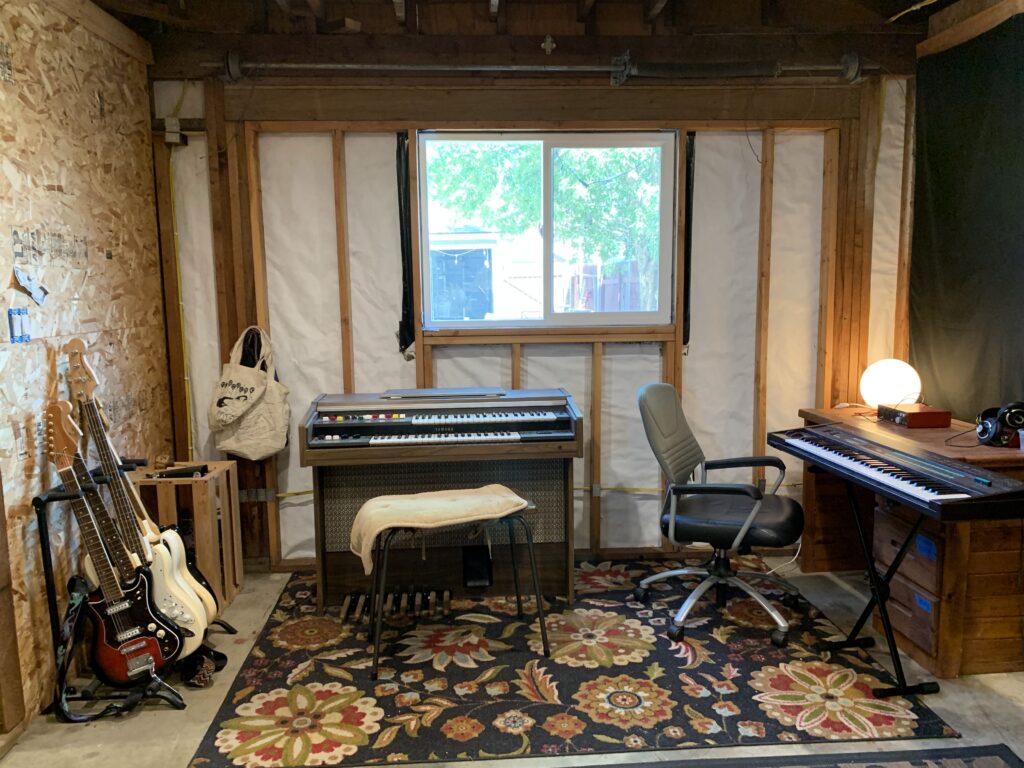
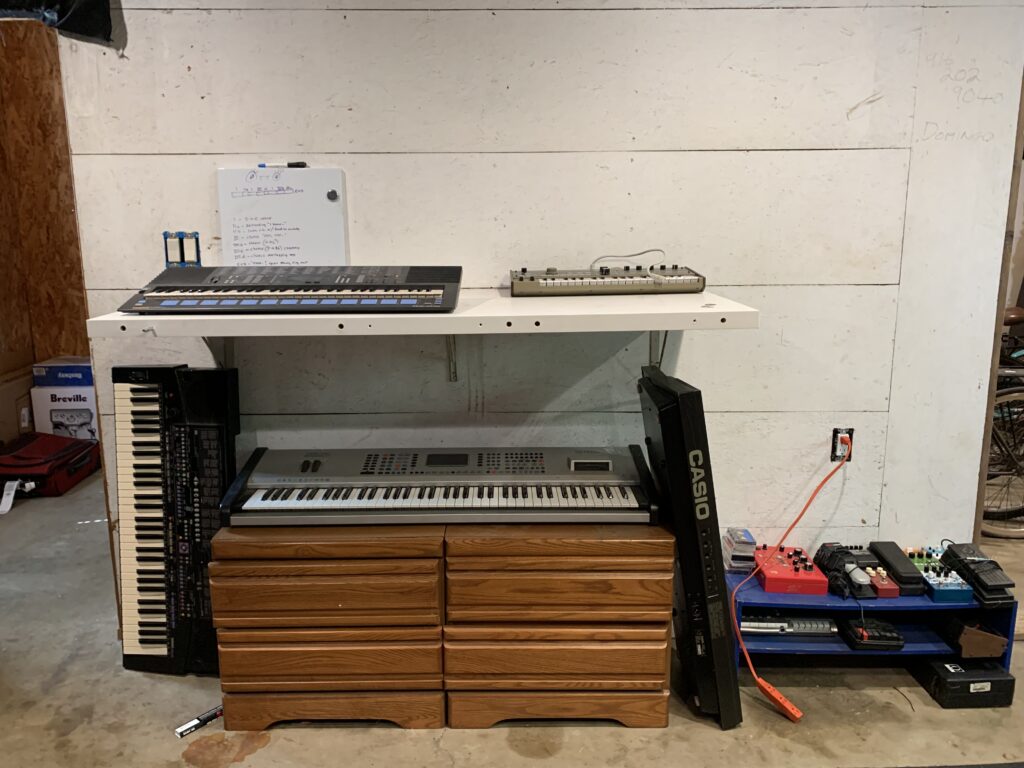
Do you seek out specific pieces of equipment, or is it kind of cobbled together?
PA: For most of my equipment, my grandpa was a hoarder and he lived on a ranch. He played piano and guitar, he’s like the only other musician in my family. So my keyboard amp is his, and that’s my favorite piece of equipment I have. Some of the equipment is my roommate’s, and I don’t really use that, but I use the amp and I use his keyboards. He had a bunch of them that were really odd and not something that I would [think to] seek out at all. But they sound cool!
Did you listen to your grandpa’s music a lot?
PA: He never released any music. He was just in country bands, I think, and I didn’t really see him play. But he was really amazing at fingerpicking, like country guitar. Like, Chet Atkins was one of his favorite artists.
That’s really interesting! It’s funny that you do a different style, but you still have that lineage…
PA: Yeah, I don’t think that my parents or my family really influenced the music I like. It’s mostly the internet. My brother and sister definitely influenced it, but that was early in my life.
How do you think that your style has changed over time? I was listening to some of Two Voices and then I flipped over to “How Do You Do It,” and it feels very different in emotional content and style. Has that evolution been conscious?
PA: “How Do You Do It” is actually a really new song. I have a lot of music that I’m going to release eventually that will probably illustrate that evolution more fluidly. At the beginning, I was super into 70s jazz fusion, and I was kind of trying to meld that with pop. And now, I have this album that’s under wraps that has, like, very obvious 70s jazz-fusion and 80s pop and shoegaze in there. “How Do You Do It” is all of those things in more of a clear way, I would say. And more of a subtle way.
Yeah, I definitely get a lot more shoegaze from it than from your old stuff – the energy is very different. I was also wondering how you did the vocals on this song? Because it seems like a very different approach.
PA: I used to do a little bit of double-tracking back in the day, but now I do, like… quadruple-tracking.
Do you change up your singing style consciously?
PA: I definitely tried to be more breathy, and yeah, my singing style has definitely changed. I’ve just wanted to be more textural and more whispery. I dunno, I think I just became a better singer in some ways. I used to sing in a band, but Two Voices was my first time actually recording my voice and trying to understand what my singing style is.
How do you think working from your own space affects how you write and record?
PA: I think it makes me a lot more comfortable. Like, I live on a really busy street, and my neighbors don’t care about… anything. [laughs] I can be kind of loud in my shed.
When you moved in, did you see the shed and instantly think, like, “I’m gonna turn this into a recording space”?
PA: Yeah! It was like, there’s a shed in the back? That’s amazing! It’s always been my goal to have a space that’s not, like, within the house to make music. I wouldn’t want to be loud in the house and disturb my roommates. I can go in the shed and no one will hear anything. The street’s pretty loud and… something about the walls, you really can’t hear much.
Have you ever recorded in a quote-unquote professional studio setting?
PA: With Mediocre Café and with my band when I was 16, we recorded at Earthtone Studios, that’s a place here in Sacramento. And that was cool! It just feels like you’re kind of giving your music away to someone else a little bit. Like a little bit of what you’re trying to do is going to be translated by someone else, you know?
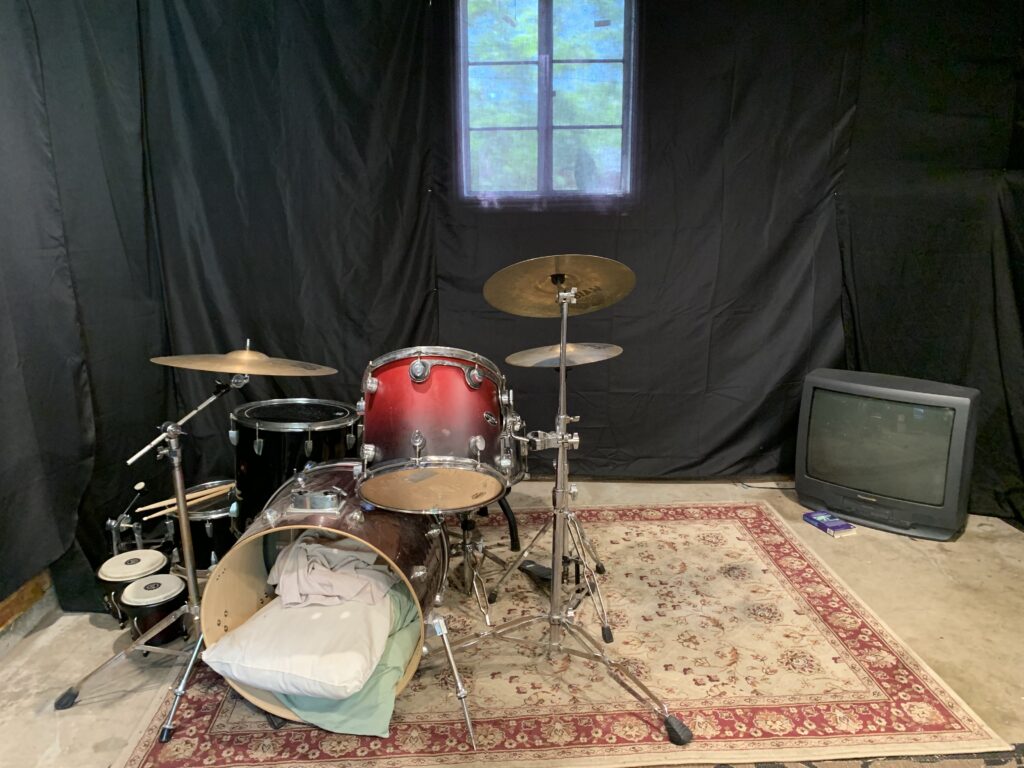
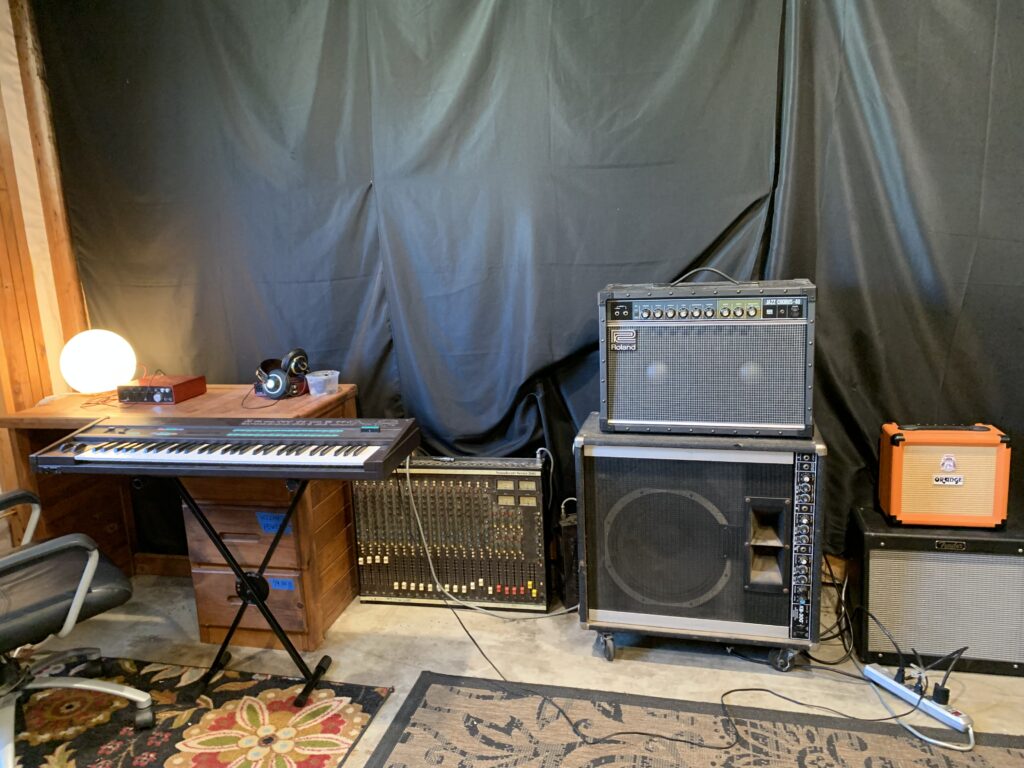
Do you only record your own stuff here, or do other artists use the space?
PA: Yeah. It sucks because there’s so much unreleased stuff [that was made here], but I played drums for this really cool no-wave, post-punk band here. It’s called Pseuodoparalysis, they don’t have any music out. I don’t think we’ve recorded much else besides that… just other projects that are also not released. [laughs] And some live stuff.
Is there a plan to release all of that stuff in the future?
PA: Totally. I have a live video that I did in there. Actually, I have a short film that I recorded the music for.
That’s cool! Like a narrative short film?
PA: Well, there’s definitely a narrative to it! It’s called The Plum Anderson Quartet, and it was, like, me and my friends wrote this script and like Part One goes into Part Four, and Part Four goes into Part Six. It has a really loose narrative, but there is a narrative to it. It’s entertaining.
It sounds very… like, similar to how your music is very freeform and jazzy, like that’s a freeform approach to structure too.
PA: Yeah, I would say so. [laughs]
Have you done any Plum Anderson live shows recently?
PA: Before the pandemic, we had a bunch of live shows and it was really fun. But then the pandemic hit and people that I was playing with moved away. Since then, I’ve wanted to make a really good band, like a really solid live band, and it’s been hard to live up to that and find people.
So if you were translating it to a live space, you’d need other musicians too?
PA: Yeah, it was a six-piece band before. We had a trumpet player who would also play keys, we had a saxophone player who would play percussion and bongos, we had a guitar player, a bass player, and a drummer. And then I would frontman it and I had a little keyboard too. And it was really fun to translate my songs into that ensemble because I’d have guitars playing keyboard parts and like, just mixing everything together. It was interesting. That feels really nice and I miss that.
I bet! Okay, I have two more questions. I was really interested when I was listening to “How Do You Do It” and also seeing the studio, how do you decide which instrument to use to produce which specific sound? Is that a conscious decision?
PA: When I recorded “How Do You Do It,” I had this funny box set up where I had three keyboards around me, and I was just trying to write stuff. Those are my favorite keyboards – I had a Korg Minilogue, I had a Kawai PH50 pop keyboard, and then I had my Yamaha DX7. So I just used all three of those and nothing else, besides some Logic drums. Everything is very impulsive when I’m recording.
Do you write in the studio, or do you go into recording with a specific idea already?
PA: Sometimes I have songs fully made in my head and I figure them out on guitar and then record it later on keyboard. It’s not very often when I can actually write a whole song within the studio space at once, but “How Do You Do It” is actually one of the ones that I did do that way.
Is a lot of this unreleased album similar to that, or is it more in your usual way of writing?
PA: Usually. I write the instrumentals and melodies, and then I go somewhere and write lyrics.
Gotcha! That’s interesting, I work the exact opposite way. I’m very lyrics-first.
Okay, so my last question: what’s next for Plum Anderson?
PA: I’m going to finally put some stuff that’s already been released out on streaming services, and I’m going to release a live video pretty soon. So keep your eyes peeled!
You can check out Plum Anderson’s new single “How Do You Do It” on their Soundcloud. You can also watch the video, directed by COCKRING drummer Caleb Keller, on Youtube. And you can follow them on Twitter or Instagram!

